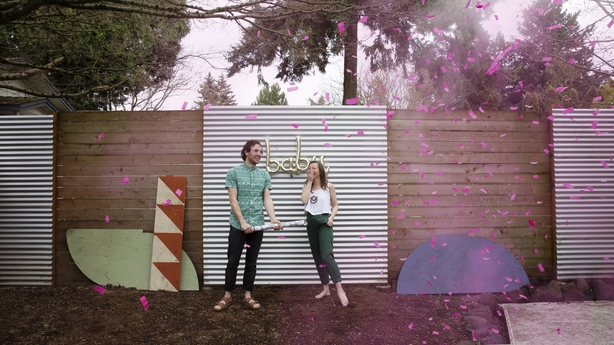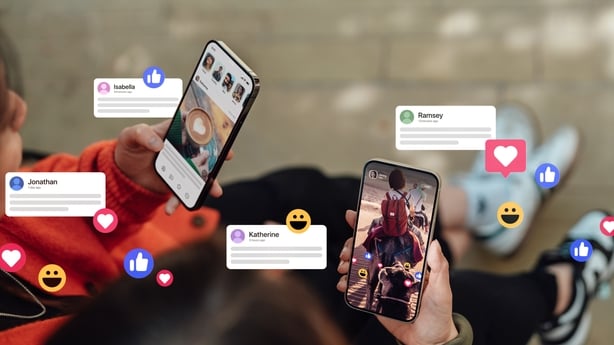The pressure to get married, have kids and buy a house has become far less of a societal issue for many women; but is it now a social media dilemma? Kate Brayden writes about navigating how social media presents big life milestones and protecting your mental health.
I turned 29 earlier this year, and am slowly creeping towards the time where my social media feed will be saturated with engagement announcements, baby scans, keys to houses (though the housing crisis has dramatically reduced that), wedding photos and birth celebrations.
Of course, these are hugely joyful moments to share with our friends and family - life experiences we feel privileged to witness come to fruition.
But why are my social media accounts becoming targeted with ads for engagement rings, wedding venues, honeymoon destinations, and even infographics about how to safely come off contraception?

I've never 'liked’ any content geared towards these topics, except maybe a friend’s engagement post, but it feels like social media took that as an invitation that I presumably wanted the same thing as other women my age.
It feels as though these platforms haven't caught up with the divergent, vibrant and often difficult reality of our lived experiences - which will strike no one as a shock. How can such technology accurately capture the essence of our true lives, when its purpose is largely to provide snapshots.
In 2024, authenticity feels like a near-extinct resource that many are harnessing in their digital spaces, especially Gen-Z. Showing the messiness of non-traditional modes of moving through your life path can now be seen as somehow bold and brash.
Now more than ever, we are seeing people forging their own path forward in life, instead of adhering to societal expectations of what we 'should' be doing at a certain age. Everyone is on their own timeline, and the precariousness of the current climate has added to the feeling that the world isn’t the same place that it used to be.
We are promised less. There isn’t the same certainty facing generations under 35. Owning a home is not a guarantee, neither is being able to afford to have children. Yet social media platforms can feel overwhelming in their ability to put pressure to tick heteronormative boxes and label them ‘achievements’.

There are insecurities to be found all over our social media presences. Anyone scrolling has probably felt a pang of jealousy over someone's travel blog, pregnancy announcement, or surprise ring reveal. It’s human.
But can women, especially those in their late 20s or 30s, use social media in a way that feels healthy to our own timeline? I spoke to some young women about this.
"On the one hand, [social media] offers this positive experience of being able to keep up with your friends who are spread out all across the world," Laura, a quality assurance engineer in Dublin, posits. "Then you have the negative element of comparing your life - and often your body - to others. Your experience is being paralleled with the best part of their lives."
She adds: "I’ve deleted Instagram multiple times over the last couple of years. All the times where I did that was because I was interacting with [social media] in a very unhealthy way. I don’t subscribe to the marriage to house to kids pipeline, but I don’t know if it’s necessarily aimed at our age group anymore.
"Nowadays, there are other ‘achievements’ than these milestones. I think everybody wants a house and somewhere to call home, though."

Laura explains that she feels "ambivalent" about meeting those landmark milestones, but is still thrown when she sees some kind of announcement on social media.
"Particularly with engagements because it reminds you of how far behind you are to everyone else, or else it just feels that way. If you're single, you’re not even in the realm of thinking about a wedding. It reminds me that you’re years away of that potentially happening to you, if at all. That can lead to some issues with self-esteem in terms of thinking, 'Why am I not in this position?’"
Despite feeling "really happy" for the friends who get to experience these milestones, Laura notes that seeing them - especially if you're not close to achieving them - can play on you in disorienting ways.
"I’ve never wanted kids - every time I see someone post about expecting a baby, it does hit me that I’m never going to have that moment of telling my partner I’m having their child."

Rachel, a software engineer, described her experience of traditional ‘milestones’ as someone who is following that general path.
"There was a period where anytime I went on Facebook or Instagram it was engagement, baby announcement, wedding, birth," Rachel notes. "You couldn’t go online without seeing some of them."
She adds: "I don’t think the marriage, house, kids pipeline is for everyone. There are a lot of people who are still marking those three big things in their lives, regardless of the order. There’s still some pressure to do it. Deviating from it can sometimes lead to judgement or perceptions from others - maybe not from our age group but from older people. It’s healthy to see so many variations."
Meanwhile, she's been in a relationship for eight years and feels "very fortunate" that they are hitting some of those milestones, but suggests following diverse people and pages online to feel less pressure.

Eimear, a senior research engineer, has tailored her feed to only show specific content tailored to her interests.
"If I see posts geared towards dieting, I try to consciously not engage so that I don’t get sent more of that style of content," she tells me. "I’m quite into crafts and probably see more posts related to that than anything else.
"I don’t want all of the ‘traditional’ milestones for myself. That being said, I did start this year saying I wanted to focus on saving so I could buy my own place."
"If you’re not reaching or desiring those milestones," she continues, "society can make it feel like you have less to celebrate."
Ultimately, everybody should be able to celebrate the big steps in their life, but maybe it's time we widen our the scope on what those steps look like.
The views expressed here are those of the author and do not represent or reflect the views of RTÉ.

